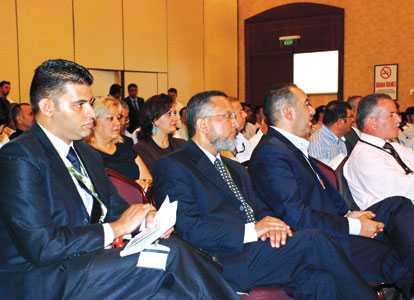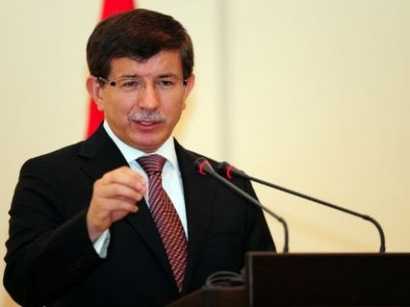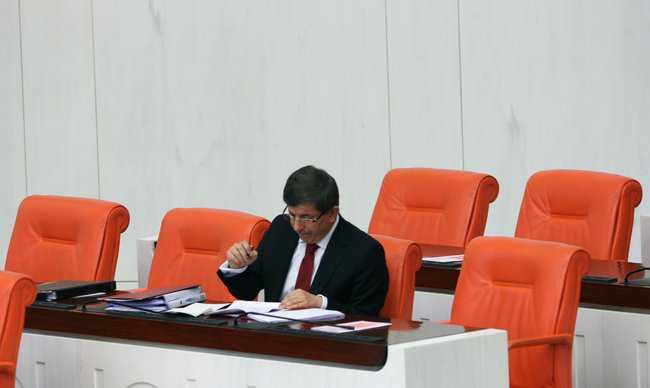By ANTHONY SHADID
ANKARA, Turkey — A newly assertive Turkey offered on Sunday a vision of a starkly realigned Middle East, where the country’s former allies in Syria and Israel fall into deeper isolation, and a burgeoning alliance with Egypt underpins a new order in a region roiled by revolt and revolution.
Burhan Ozbilici/Associated Press
Turkey’s foreign minister, Ahmet Davutoglu, predicted an “axis of democracy” in his region.
Related
-
Turkish Leader Urges Vote for Palestinian Statehood (September 14, 2011)
-
Premier of Turkey Takes Role in Region (September 13, 2011)
-
Times Topic: Turkey
The portrait was described by Foreign Minister Ahmet Davutoglu of Turkey in an hourlong interview before he was to leave for the United Nations, where a contentious debate was expected this week over a Palestinian bid for recognition as a state. Viewed by many as the architect of a foreign policy that has made Turkey one of the most relevant players in the Muslim world, Mr. Davutoglu pointed to that issue and others to describe a region in the midst of a transformation. Turkey, he said, was “right at the center of everything.”
He declared that Israel was solely responsible for the near collapse in relations with Turkey, once an ally, and he accused Syria’s president of lying to him after Turkish officials offered the government there a “last chance” to salvage power by halting its brutal crackdown on dissent.
Strikingly, he predicted a partnership between Turkey and Egypt, two of the region’s militarily strongest and most populous and influential countries, which he said could create a new axis of power at a time when American influence in the Middle East seems to be diminishing.
“This is what we want,” Mr. Davutoglu said.
“This will not be an axis against any other country — not Israel, not Iran, not any other country, but this will be an axis of democracy, real democracy,” he added. “That will be an axis of democracy of the two biggest nations in our region, from the north to the south, from the Black Sea down to the Nile Valley in Sudan.”
His comments came after a tour last week by Turkish leaders — Prime Minister Recep Tayyip Erdogan and Mr. Davutoglu among them — of Tunisia, Egypt and Libya, the three Arab countries that have undergone revolutions this year. His criticism of old allies and embrace of new ones underscored the confidence of Turkey these days, as it tries to position itself on the winning side in a region unrecognizable from a year ago.
Unlike an anxious Israel, a skeptical Iran and a United States whose regional policy has been criticized as seeming muddled and even contradictory at times, Turkey has recovered from early missteps to offer itself as a model for democratic transition and economic growth at a time when the Middle East and northern Africa have been seized by radical change. The remarkably warm reception of Turkey in the Arab world — a region Turks once viewed with disdain — is a development almost as seismic as the Arab revolts and revolutions themselves.
Mr. Davutoglu credited a “psychological affinity” between Turkey and much of the Arab world, which was ruled by the Ottoman Empire for four centuries from Istanbul.
The foreign minister, 52, remains more scholar than politician, though he has a diplomat’s knack for bridging divides. Cerebral and soft-spoken, he offered a speech this summer to Libyan rebels in Benghazi — in Arabic. Soon after the revolution in Tunisia, he hailed the people there as the “sons of Ibn Khaldoun,” one of the Arab world’s greatest philosophers, born in Tunis in the 14th century. “We’re not here to teach you,” he said. “You know what to do. Ibn Khaldoun’s grandsons deserve the best political system.”
That sense of cultural affinity has facilitated Turkey’s entry into the region, as has the successful model of Mr. Davutoglu’s Justice and Development Party, whose deeply pious leaders have won three consecutive elections, presided over a booming economy and inaugurated reform that has made Turkey a more liberal, modern and confident place. Mr. Erdogan’s defense of Palestinian rights and criticism of Israel — relations between Turkey and Israel collapsed after Israeli troops killed nine people on board a Turkish flotilla trying to break the blockade of Gaza in 2010 — has bolstered his popularity.
Last week, Mr. Erdogan was afforded a rapturous welcome in Egypt, where thoroughfares were adorned with his billboard-size portraits. (“Lend us Erdogan for a month!” wrote a columnist in Al Wafd, an Egyptian newspaper.)
Mr. Davutolglu, who accompanied him there, said Egypt would become the focus of Turkish efforts, as an older American-backed order, buttressed by Israel, Saudi Arabia and, to a lesser extent, prerevolutionary Egypt, begins to crumble. On the vote over a Palestinian state, the United States, in particular, finds itself almost completely isolated.
He also predicted that Turkey’s $1.5 billion investment in Egypt would grow to $5 billion within two years and that total trade would increase to $5 billion, from $3.5 billion now, by the end of 2012, then $10 billion by 2015. As if to underscore the importance Turkey saw in economic cooperation, 280 businessmen accompanied the Turkish delegation, and Mr. Davutoglu said they signed about $1 billion in contracts in a single day.
“For democracy, we need a strong economy,” he said.






